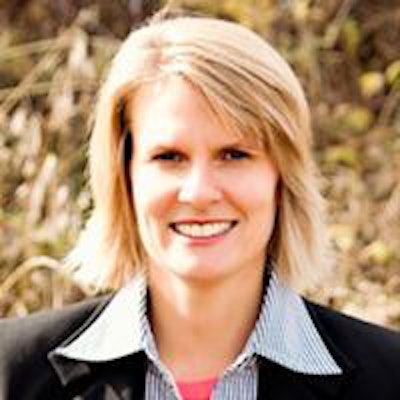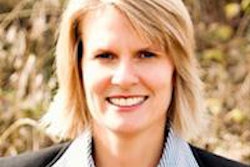
I'm writing this a week before I present two topics at the Michigan Dental Association's Annual Session. I am not the big show speaker, but rather a little side-show speaker. It's where speakers begin. It's a foot in the door, and it's a chance for me to pour my heart out with Michigan dentists, hygienists, and assistants about issues beyond 32 teeth.
Issues beyond 32 teeth keep popping up in my life as a dentist, and I think it's a sign that we can do more and expand our scope of practice to ensure a greater impact on people's oral health and overall health.
 Lisa Knowles, DDS.
Lisa Knowles, DDS.One little boy came to my practice for a checkup and recare appointment. I noticed he had a chewed-up lower lip -- a nervous habit his dad reported. This little guy and I chatted about what made him nervous and if he ever worried about things. I told him there are people he could talk to about his worries, and that we have one such person, a counselor, in our basement level office suite. He told me he worried a lot about homework, and Dad chimed in and said, "The girls are so much smarter than the boys at this age, so he has a lot of homework to do each night." I asked what grade he was in. He said first grade. First grade.
Is this the kind of pressure we want our first-graders to have? Do we even want them to have homework? Does it matter if girls are smarter at this age or not?
As this little boy's appointment ended, he hopped out of my chair and started walking down our hallway -- opposite to where the exit door stood. I asked him where he was going and tried to point him into the right direction to leave. He said, "I'm going to the basement to talk about my worries." I closed my eyes for a second and swallowed hard. He wanted to talk to someone so badly and so immediately that he marched his way to our basement. I had to break it to him that there was a separate entrance for their office and that he would need an appointment.
We gave his dad a referral to the counselor in our lower level and highly suggested he try and get an appointment. We tied it back to his child's oral care and said it may help stop the ferocious lip chewing (among other things).
We are planting a lot of seeds right now with parents and patients about their overall health -- regarding both their physical and mental wellness. We may not have all of the answers, but we do have many indicators of something bigger going on in our patients' lives.
Sometimes we get these little signs, these indicators of a patient's overall health. They are often so subtle we miss them. Heightened awareness and know-how is what I hope to bring to our profession.
The more I put two and two together, the more professional satisfaction I receive, knowing I may help one more patient get the help he or she needs by educating one more dentist or hygienist about oral health indicators that have systemic links.
Bone loss may indicate a diabetes or heart disease correlation. Lip chewing may indicate a stress factor. Whatever links there are, I am interested in finding more of them and working diligently to share the connections and latest research with dentists and hygienists who were never trained to think obtusely like this. It's something that came to me after years of practice, a tremendous amount of reading, and an insatiable appetite for helping patients find answers to their health problems.
This type of thinking helped me grow an amazing practice; we nearly doubled our net income from the previous owner's. It's unfortunate, but many dentists habitually think talking is a waste of time because it's not profitable or not within our scope of practice. In actuality, it's the talking -- the communication -- that often makes the practice so profitable and meaning-filled when done well. I truly have to emphasize the "when done well" part. Poor communication can have the opposite effect on any practice.
As I prepare for my speaking sessions, I hope to receive even more feedback about what indicators professionals are finding, linking, researching, and questioning. We are all in this together for the overall health of our patients. We are all connected just as our body parts are all connected. As we piece ourselves back together as collaborators in overall health, I anticipate profound discoveries and breakthroughs will continue to emerge for medicine and dentistry.
Like any good speaker, my ultimate goal is to educate others in an engaging atmosphere. After many years of sitting through lackluster class lectures and continuing education presentations, I make a conscious effort to engage my audience at the least and entertain them at the most, so that what I say is absorbed and retained. Many providers are not used to being asked to engage and think while in a session. Some like it; some do not. I truly believe learning takes place when all parts of our mind are stimulated. I try to create this type of experience for my participants while still being mindful of those people who simply like to sit and listen.
Being a speaker is a hard job. But, I am up for the challenge because I am inspired by the little guys -- and big guys -- who come to me with chewed-up lips and other oral health issues. They tell me a lot of stories, and I want to share them with the world because, as we hear more of their stories, we understand the problems and pain our patients possess; at that moment, we can better fulfill our life ambitions to help others in a truly profound and purposeful way.
We are extremely lucky as dental professionals to be in a position to help fix people's teeth and help fix their lives. For those who want to do more than fix teeth, let's go and let's keep learning how to do it really well. It will be the new norm. I became a speaker to help my colleagues learn how to see these problems better. I do not have all the answers, but I do have a whole lot of questions, and sometimes that's where we need to start.
Lisa Knowles, DDS, currently practices in Charlotte, MI. She is an adjunct professor at the University of Detroit Mercy School of Dentistry, and offers private lesson consulting. For more information or to contact Dr. Knowles, email her at [email protected] or view her website at IntentionalDental.com.
The comments and observations expressed herein do not necessarily reflect the opinions of DrBicuspid.com, nor should they be construed as an endorsement or admonishment of any particular idea, vendor, or organization.



















